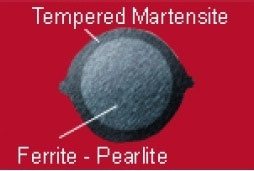The HYQST technology ensures a uniform quality across the bar. The proof is a perfect
ring that can be seen across any cross-section of the bar.
JSW NEOSTEEL is manufactured at JSW Steel – Vijaynagar Works and JSW Steel – Dolvi works.
It is manufactured using virgin iron ore. JSW NEOSTEEL is toughened high strength HYQST
(High Yield Quenched and Self Tempered) TMT Bar conforming to IS 1786:2008,. TMT are
hot-rolled from steel billets are subjected to the thermo-mechanical treatment. The
HYQST technology ensures a uniform quality across the bar. The proof is a perfect ring
that can be seen across any cross-section of the bar.
Stages of TMT manufacturing
ASourcing and processing of Raw Material
The raw material viz. iron ore, coal/coke and the fluxes
(limestone and dolomite) are sourced from
their
respective locations and are stacked, reclaimed and blended
in the required proportion.
BBeneficiation, Agglomeration and conversion
of coke to coal
The iron ore is beneficiated to increase the iron content in
it. Then, the iron ore fines are
agglomerated into pellets and sinter to enhance
productivity. The coal is converted to coke for later
use.
CIron making
Coke, ore and sinter are fed, or ‘charged’, into the top of
the blast furnace, together with limestone.
A
hot air blast is injected through nozzles in the base of the
furnace. This causes reduction of iron ore
and the iron in the ore and sinter is melted out to form a
pool of molten metal in the bottom, or
hearth,
of the furnace. The limestone combines with impurities and
molten rock from the iron ore and sinter,
forming a liquid ‘slag' which, being lighter than the metal,
floats on top of it.
APre treatment and primary
steelmaking
The molten iron is subjected to pre treatment and is
converted to steel in a convertor or a Basic
oxygen
Furnace. Oxygen is blown into the BOF which contains the
molten iron from the blast furnace. This oxygen
combines with carbon in the iron and carbon is
eliminated in the form of carbon di oxide.
BSecondary Steelmaking
The steel is further subjected to Ladle heating for
refining the chemistry of the steel. This is done
in
a Ladle Heating Furnace (LHF) and RH De-gasifier
CContinuous Casting
In the continuous casting process the molten metal is
poured directly into a casting machine to produce
billets, with a cross section 165mm2
AQuenching
When a hot rolled bar leaves the final mill stand
(including roughing mill, intermediate mill,
finishing mill, etc.), it is instantaneously
quenched 9 a type of heat treatment where the rebars
are
rapidly cooled to obtain certain material
properties) using a special water spray system in
the
quenching box. This is done to harden the surface
while the core still remains hot and soft.
BSelf-tempering
After leaving the quenching box, the core continues
to supply heat to the surface since it is at a
relatively higher temperature. This causes the
tempering of the outer martensitic layer into a
structure
called Tempered Martensite. The core stays
austenitic (a typical cubical crystalline structure)
at this stage also.
CAtmospheric cooling
Post the self-tempering, the bars are subjected to
atmospheric cooling (at room temperature) on special
cooling beds where the austenitic core gets
transformed into a ductile ferrite-pearlite
structure. The
final structure, thus is a perfect combination of a
strong outer layer (tempered martensite) with a
ductile core (ferrite).

Due to the partial quenching (heat treatment), the micro structure of the bar
consists of Tempered Martensite in the periphery and Ferrite Pearlite in the
centre The strength to the bar is by Tempered Martensite layer while the
ductility to the bar is incorporated by the Ferrite- Pearlite layer.
The perfect balance of strength and ductility in JSW Neosteel TMT bars
results in a highly safe design with minimum use of reinforcement and at the
same time making the structure safe against the action of earthquakes.
Watch the entire
manufacturing process